- +255 755353108
- info@ellbarktours.com
- +255, Moshi Tanzania
- Home
- Safari
SAFARI ACCOMMODATION
- Mountain Treks
MOUNT MERU
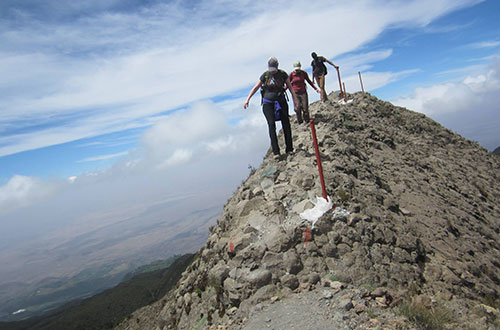
- Day Trips
- Beach & Holiday
- ellbark
- Contact Us
- FAQ

Being a short, steep and direct route, Umbwe is considered to be very difficult and is the most challenging way up Mount Kilimanjaro. Due to the quick ascent, Umbwe does not provide the necessary stages for altitude acclimatization. Although the traffic on this route is very low, the chances of success are also low. It is recommended to very strong hikers who are confident in their ability to acclimatize.
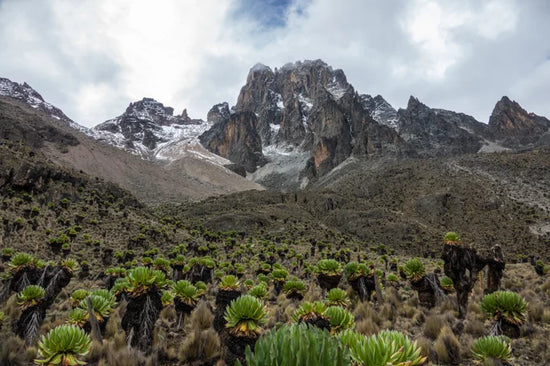
The Umbwe route is deservedly considered most challenging because of the fast direct ascent to high altitudes. It does not provide the time needed for acclimatization, which leads to altitude sickness.
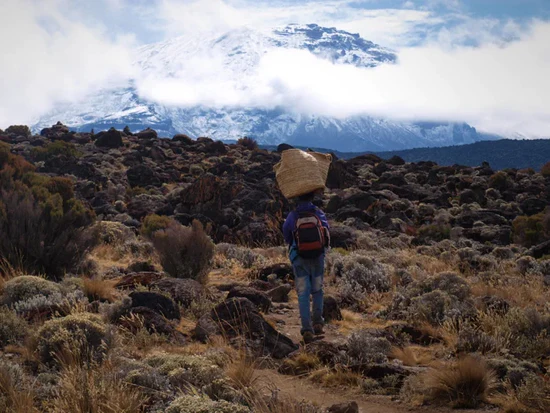
Despite its difficulty, the Umbwe route is a non-technical climb. It offers steep ascents and requires trekkers to scramble over rocks and tree roots at certain points.

The early days of this path have arguably the best views of any part of the mountain, save perhaps the summit itself. At times, there are stunning vistas to be seen to both the left and the right as you make your way up the trail.
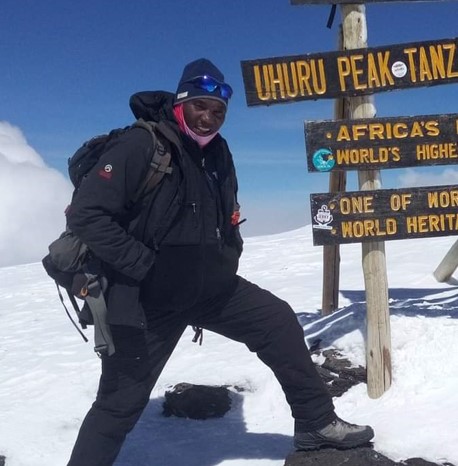
Because of it’s steep, direct approach, the success rate on Umbwe route is lower than some of the other routes.
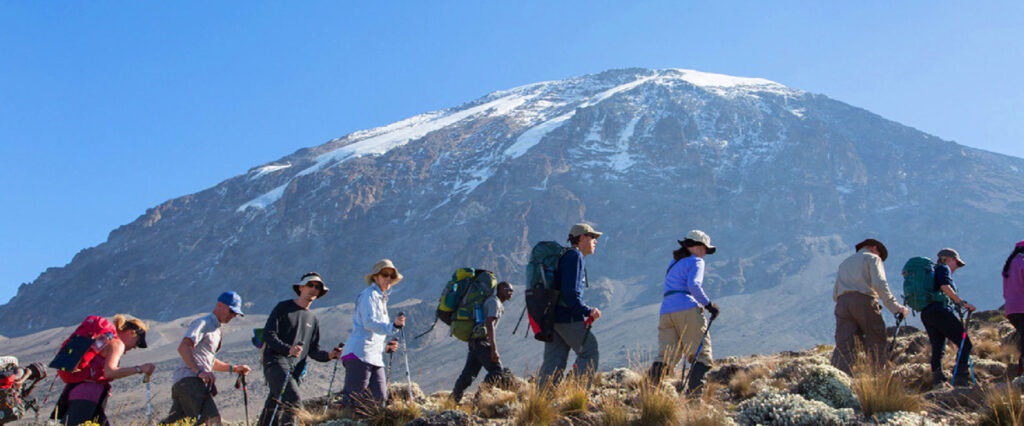
Because of its reputation as a difficult climb, very few people actually walk this trail, leaving it open and relatively untouched.
Day 1 – Arrive at Kilimanjaro International Airport,
Day 2 – Umbwe Gate (1,600 meters) to Umbwe Cave Camp (2,850 meters)
Day 3 – Umbwe Cave Camp (2,850 meters) to Baranco Camp (3,900 meters)
Day 4 – Baranco Camp (3,900 meters) to Karanga Camp (4,034 meters)
Day 5 – Karanga Camp (3,960 meters) to Barafu Camp (4,670 meters)
Day 6 – Barafu Camp (4,670 meters) to Uhuru Peak (5,895 meters) and then Mweka Camp (3,100 meters)
Day 7 – Mweka Camp (3,100 meters) to Mweka Gate (1,640 meters)
Day 8 – Moshi/Arusha/Departure
Day 1 – Arrive at Kilimanjaro International Airport,
Met our driver upon Arrival and transfer to hotel in Moshi,
Activities: Transfer
Accommodation & Meals: Salsanero Hotel, B, B.
Day 2 – Umbwe Gate (1,600 meters) to Umbwe Cave Camp (2,850 meters)
The Umbwe Route departs from the south. Most trekkers get driven from Moshi or Arusha to the Machame Gate, where registration takes place. From there trekkers are transferred to the Umbwe Gate at 1,600 meters. Here you will start your trek with your guide and porters in tow. The route follows a forestry track through the rainforest before steepening between the Lonzo and Umbwe Rivers. If the weather is clear you will get a good view of Kibo in the distance. It takes approximately 5-7 hours to reach Umbwe Cave Camp at 2,850 meters; 10.5km / 6 miles from your starting point. The camp sits between large evergreen trees and thick undergrowth, with Umbwe Cave a short walk away. On arrival your tents will already be assembled and dinner will be served in your mess tent.
Estimated Trekking distance: 10.5km / 6 miles
Estimated Trekking time: 5-7 hours
Zone: Rainforest zone
Activities: Hiking/Trekking
Accommodation & Meals: Umbwe Cave Camp (2,850 meters). B, L, D.
Day 3 – Umbwe Cave Camp (2,850 meters) to Baranco Camp (3,900 meters)
On Day two the landscape changes rapidly from rainforest to moorland, with rocky outcrops and sparse vegetation. The path follows the narrow Umbwe Route ridge until it begins to flatten close to the Baranco Valley. The Baranco Camp (3,900 meters) sits in the valley under the shadow of the Great Baranco Wall with Kibo visible in the distance. You will notice the camp is pretty busy. This is because you will be joining hikers from the Machame, Lemosho and Shira Route here.
Estimated Trekking distance: 6.5km / 3.5 miles
Estimated Trekking time: 4-6 hours
Zone: Rainforest zone/ Low Alpine Zone
Activities: Hiking/Trekking
Accommodation & Meals: Baranco Camp (3,900 meters). B, L, D.
Day 4 – Baranco Camp (3,900 meters) to Karanga Camp (3,960 meters)
Day three starts with a steep climb up the 257 meter Baranco Wall. No technical skills are required but you will need to use all four limbs to scramble up to the top. From here you will follow an up and down route along the Southern Circuit (see Umbwe Map above) through the Karanga Valley and up to Karanga Camp (3,960 meters). You will stop at Karanga Camp for the night, unless you are on a five day route, in which case you will continue on to Barafu Camp (4,670 meters)
Estimated Trekking distance: 6km / 3.5 miles
Estimated Trekking time: 4-6 hours
Zone: Low alpine zone / High alpine zone
Activities: Hiking/Trekking
Accommodation & Meals: Karanga Camp (3,960 meters). B, L, D.
Day 5 – Karanga Camp (3,960 meters) to Barafu Camp (4,670 meters)
Day four is a relatively short climb from Karanga Camp to Barafu Camp at 4,670 meters. The route sojourns through the rocky and sparsely vegetated high alpine desert zone. Barafu Camp is very exposed to the elements, especially the gale force winds that are common at this altitude. You will arrive at the camp around lunchtime, giving you lots of time to rest or potentially climb a bit higher if you are feeling up to it. Many people have lost their appetite by this stage in the trek but it is important that you try to eat some food. Set an hour aside to ensure that your gear is ready and packed for the summit ascent which begins around midnight. Don’t forget to carry additional batteries for your headlamp and camera, and remember to make sure your water bottles are well insulated (wrapping them in an extra pair of warm socks works well). Try get to bed before 19:00 as you will be awoken around 23:30 to begin your summit attempt.
Estimated Trekking distance: 3.5km / 2 miles
Estimated Trekking time: 4-5 hours
Zone: High alpine zone
Activities: Hiking/Trekking
Accommodation & Meals: Barafu Camp (4,670 meters). B, L, D.
Day 6 – Barafu Camp (4,670 meters) to Uhuru Peak (5,895 meters) and then Mweka Camp (3,100 meters)
After being awoken with hot tea and biscuits you will set off up the heavily screed slopes of Kibo. The route up to the crater rim is long and arduous! Your physical and mental capacities will be seriously tested. It is important to remain focused on your goal, one step at a time. Around dawn you will reach Stella Point (5,739 meters) at the top of the crater rim. This is not the summit but is a major milestone. Take a moment to rest and enjoy where you have got to but don’t lie down as this can stymie your final push to the summit. From Stella Point the route flattens as you walk an additional 1-2 hours to Uhuru Peak (5,895 meters). You will not be able to stay too long at the summit as the lack of oxygen and cold is debilitating. Make sure to get all the pictures and video footage you want and then make your way back to Stella Point. Many trekkers decide to scree slide down the slopes of Kibo to Barafu Camp where you will have a chance to take a short break before continuing on to Mweka Camp. Remember to use your trekking poles as the impact on your knees of the 5-8 hour descent from the Summit to Mweka Camp can be very tiring and painful.
Estimated Trekking distance: 4.5km / 3 miles ascent and then 11km / 7 mile descent
Estimated Trekking time: Trekking time: 6-8 hours to the summit and then 5-8 hours to Mweka
Zone: Glacial zone and the all preceding zones
Activities: Hiking/Trekking
Accommodation & Meals: Mweka Camp (3,100 meters). B, L, D.
Day 7 – Mweka Camp (3,100 meters) to Mweka Gate (1,640 meters)
Today you will enjoy your last breakfast on the mountain before heading down through the thick undergrowth of the lower slopes. Your knees may be very sore so go slowly and make sure of each footing as you descend to Mweka Gate. On arrival at the gate you will sign-out with the authorities and be presented with your summit certificate. At this point it is customary to present your porters and guides with their tips, before being transported back to your hotel in Moshi or Arusha.
Estimated Trekking distance: 9km / 6 miles
Estimated Trekking time: 3-5 hours
Zone: Rainforest zone
Activities: Hiking/Trekking
Accommodation & Meals: Salsanero Hotel, B, L.
Day 8 – Moshi/Arusha/Departure
Transfer to Kilimanjaro airport for your return flight, or Proceed Safari with us.
Activities: Transfer
Accommodation & Meals: B, B.
Prices are quoted in $ per person | ||||||||
| Number of people in a group | Days | 1Pax | 2Pax | 3Pax | 4Pax | 5Pax | 6Pax | 10Pax+ |
| Validity: 01 Jan – 31 Dec, 2024 | 6 | 2,955 | 2,280 | 2,214 | 2,208 | 2,110 | 2,123 | 2,100 |
| Validity: 01 Jan – 31 Dec, 2024 | 7 | 3,263 | 2,567 | 2,486 | 2,449 | 2,372 | 2,371 | 2,370 |
| Optional: Add: Cost for Extra Night at any camp | 350 | 350 | 350 | 350 | 350 | 350 | 350 | |
Note:
You can leave extra luggage in Hotel in Arusha (if you leave any valuable items like cash, jewelry, etc) make sure you get a receipt for that.
*If you add that day, instead of just staying at the hotel, we can offer a day trip to the nearby Arusha National Park for game drives for $180pp inclusive of 1to 2 hours hiking on mount Meru. Starting from 4 pax in a group.
1. HOW DIFFICULT IS UMBWE ROUTE?
The Umbwe route is a steep and direct climb to the Uhuru peak. It offers the least time for the body to acclimatize to the rising altitudes. That combined with the physical exertion on this trek makes it the most difficult route to hike up Kilimanjaro.
2. HOW LONG IS UMBWE ROUTE?
The short Umbwe Route is approximately 52kms (32miles) from start to finish. It is usually done over 6 days, but a shorter 5-day itinerary is also possible. The average daily altitude gain is about 840m per day, with the summit day gain of 1200m from Barafu camp to Uhuru peak.
3. WHAT IS UMBWE ROUTE’S SUMMIT SUCCESS RATE?
The Umbwe Route is one of the shortest routes up Kilimanjaro which has a very poor chance for acclimatization due to it’s steepness and days spend in the mountain. Whilst there are no official statistics, the average success rate across all operators is 70%. However, we have a summit success rate of over 90% for the Umbwe Route!
4. HOW IS THE SCENERY ON THE UMBWE ROUTE?
The first two days of the Umbwe Route trek are through tree plantations and then beautiful and rich rain forest, before continuing into the steep Western Breach and Arrow’s Glacier path, scramble up to the Reutsch Crater (5,800 meters) where trekkers spend the night near one of Kilimanjaro’s last remaining glaciers, Furtwangler Glacier.
The origin of the Name ellbark
E-Elephants
L-Lion
L-Leopard
Ba-Baffalo
R-Rhino
K-Kilimanjaro

©2024 ellbark tours || Moshi Kilimanjaro Tanzania
Designed by Amandus J. Kassambili, Contact:+255759971680, Moshi Kilimanjaro